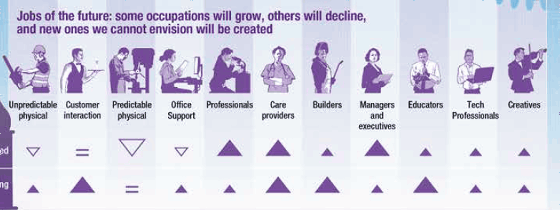Up to 800 million people are deprived of jobs by robots in 2030, and half of the working population in Japan is looking for new jobs

byDominik Scythe
Consulting company McKinsey investigated 800 professions in 46 countries around the world and it turned out that up to 800 million workers were affected by robotic automation and it is possible that they will lose their jobs by 2030.
What the future of work will mean for jobs, skills, and wages | McKinsey & amp; Company
https://www.mckinsey.com/global-themes/future-of-organizations-and-work/what-the-future-of-work-will-mean-for-jobs-skills-and-wages
Robots Are Coming for Jobs of as Many as 800 Million Worldwide - Bloomberg
https://www.bloomberg.com/news/articles/2017-11-29/robots-are-coming-for-jobs-of-as-many-as-800-million-worldwide
Robot automation will 'take 800 million jobs by 2030' - report - BBC News
http://www.bbc.com/news/world-us-canada-42170100
According to the survey report, how the robotic automation will affect will vary from country to country. One third of workers in wealthy countries like Germany and the United States are supposed to be affected by half the workers in Japan in the automation by robot and it is necessary to receive reeducation for new jobs It is said that it will come out. It is highly likely that you are forced to change jobs, especially those involved in machine pilots and food and beverage businesses, brokers in mortgage loansParalegal, Accountants, back office staff, etc. are also likely to be affected.

Less susceptible to occupation the impact of automation by robots, doctors, lawyers, bartenders, gardeners, plumbers, the profession expertise is requiring such care workers is the center. In developed countries, survey indicates that university education is required more than ever, as the need for less professional education decreases.
However, the labor force affected by the progress of robotic automation will change. In the case of moderate progress, 10 to 11 million people in Japan seem to be forced to change occupation if there are rapid progress 27 million people.

Meanwhile, in countries where there is no economic margin to automate by machines, the influence of robots is considered to be small. For example, in India, the occupation of robots is expected to be about 9%.
The above change is said to be a large scale comparable to the transition from agriculture to the industrial business economy that occurred in the early 1900s in the United States. If the evolution of the robot is not rapid, it is said that about 400 million people will be deprived of the job in the world, but in any case, people in their thirties, forties and forties will acquire new vocational skills Becomes a big problem. Even if automation is done, salaries of middle-aged families remain unchanged, but researchers showed that some program to guarantee the bottom line of living would be needed to grow the economy and stabilize society It was.
In addition, when automation is carried out, in countries where the labor force population like India is on an increasing trend, GDP will increase while in countries where the labor force is declining like Japan it can not expect to increase GDP much It is.
Related Posts:
in Note, Posted by darkhorse_log







